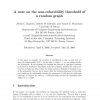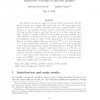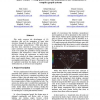765 search results - page 37 / 153 » Graph Coloring with Rejection |
116
click to vote
COMBINATORICS
2000
15 years 2 months ago
2000
In this paper we consider the problem of establishing a value r0 such that almost all random graphs with n vertices and rn edges, r > r0, are asymptotically not 3-colorable. In...
101
click to vote
IPL
1998
15 years 2 months ago
1998
An equitable coloring of a graph is a proper vertex coloring such that the sizes of any two color classes differ by at most one. The least positive integer k for which there exis...
104
click to vote
ICAT
2007
IEEE
15 years 8 months ago
2007
IEEE
This study concerns the development of 3D interfaces that aid the navigation of large data structures through the usage of the HSV color space, and the ensuing “spatial frames�...
103
click to vote
TCS
2008
15 years 2 months ago
2008
Given a graph G and an integer k, two players alternatively color the edges of G using k colors so that adjacent edges get different colors. The game chromatic index g(G) is the m...
146
click to vote
RSA
2008
15 years 1 months ago
2008
: Given a graph G and an integer k, two players take turns coloring the vertices of G one by one using k colors so that neighboring vertices get different colors. The first player ...



